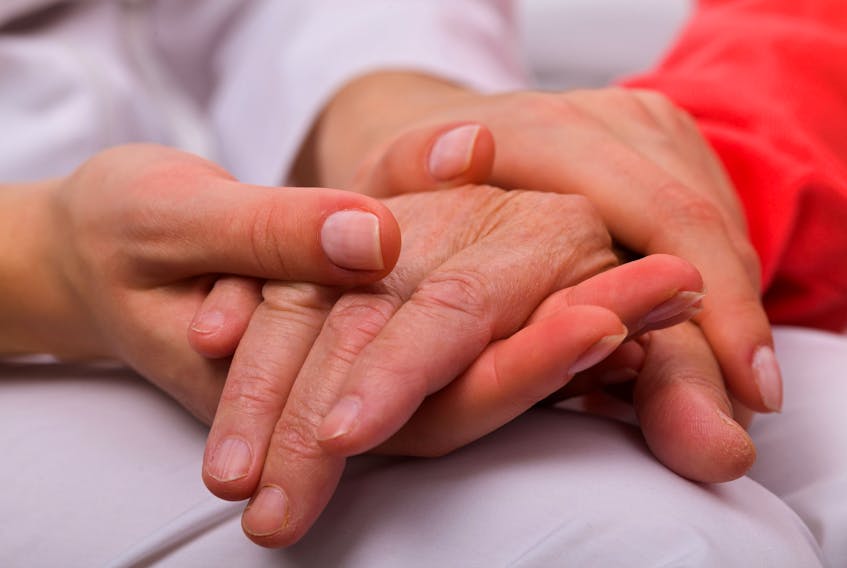Island EMS paramedics will soon play a big role in bridging the gap between hospital and home care.
The province announced three new programs on Tuesday aimed at enhancing home care access for Islanders. The federal government will fund the initiatives as a new innovation, with $750,000 being provided this year.
Two of the initiatives are rapid bridging programs, one focusing on hospitals and another emphasizing palliative care, while the third will be a “check-in” program for seniors.
Health Minister Robert Mitchell said the programs met the federal government’s funding requirement of being a new innovation and should ultimately decrease patients’ length of stays in hospital, decrease re-admission and provide better access to crucial home care.
“This is bringing in another layer or piece that will see health-care professionals work together for positive outcomes. It’s all about having the best care for Islanders,” said Mitchell, noting that most Islanders who receive home care are seniors.
“Seniors are our most vulnerable. We’re trying to keep them at home because that’s where they can heal better and progress better.”
Rapid bridging programs are intended to bridge gaps that can occur when patients are discharged from hospital but still require some professional medical support.
“It is important to recognize that these initiatives are not replacing existing publically funded and delivered home care services,” he said. “Rather, they are an example of what can happen when we work together with our staff and health-care partners.”
-Dr. André Celliers
Mitchell said Island EMS paramedics will be vital to the programs.
“They’re located all across P.E.I., so this was a good way to integrate paramedics into the system,” he said, adding that the new roles will be in tandem with current duties of Island EMS.
“They’ll have a big part to play but, at the same time, they have other duties they do well and they’ll continue to do those as well.”
Advance care paramedics have the training to provide a variety of services. They also have down-time between emergency calls and the flexibility to travel across the province.
Island EMS paramedic chief Darcy Clinton said the group is looking forward to the collaboration and said the initiatives build on the current Paramedics Providing Palliative Care at Home program.
“This is a unique opportunity for Island EMS to continue to support allied health professionals in home care as we continue to work together to provide the kind of collaborative care Islanders can benefit from.”
The initiatives will also see the province hire three new nurses to co-ordinate the roles of advanced paramedics, as well as a nurse practitioner for home care.
Dr. André Celliers, chief of family and community medicine, said the initiatives will build on the home care program by identifying Islanders who can benefit from home services earlier.
“It is important to recognize that these initiatives are not replacing existing publically funded and delivered home care services,” he said. “Rather, they are an example of what can happen when we work together with our staff and health-care partners.”
Mitchell said while there is no definite roll-out time for the programs, health-care professionals began developing the initiatives several months ago.
He said that collaboration will continue until the programs are ready.
“We want to make sure we get it right,” he said. “Moving forward, it’s going to be a very collaborative process with all those health professionals.”
- The provincial home care program provides support for thousands of Islanders every month. However, the province says spikes in demand for services can be unpredictable, and program intake does not occur on the evenings and weekends
- Last year, about 4,500 Islanders received home care services with staff supporting about 2,200 clients each month
- Home care provides a range of health-care and support services to individuals with acute, chronic, palliative or rehabilitative health care needs
- Last year, the Pan-Canadian Health Accord announced targeted and conditional funding for home care. Available federal funding must be invested into new and innovative approaches and cannot be used to subsidize existing services
- P.E.I.’s three new initiatives collaborate with a number of health-care partners, including Island EMS, and aim to decrease patients’ length of stays in hospital, decrease re-admission rates, decrease emergency department visits by seniors for non-emergency concerns and provide timely access to critical care for Islanders at home
- Two of the initiatives are rapid bridging programs, one focusing on hospitals and another emphasizing palliative care. The first will provide treatments until the patient can be admitted into the home care program. The other will support patients by arranging paramedic follow-ups at home in conjunction with home care and palliative care support
- The check-in program aims to serve seniors and those living at home who are at an increased risk. Patients who are not part of the provincial home care program would be referred to local paramedics for scheduled home visits
- More information about the Provincial Home Care Program is available at www.healthpei.ca/homecare









